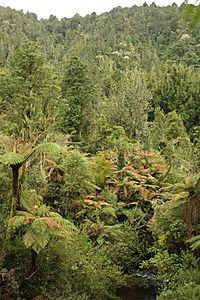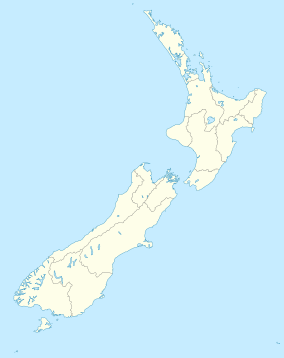Pirongia Forest Park facts for kids
Quick facts for kids Pirongia Forest Park |
|
|---|---|

Native bush in Pirongia Forest
|
|
| Location | North Island, New Zealand |
| Nearest town | Pirongia |
| Area | 16,773.4 hectares (41,448 acres) |
| Established | 1971 |
| Governing body | Department of Conservation |
Pirongia Forest Park is a special place in New Zealand. It's a protected area located about 30 kilometers southwest of Hamilton, New Zealand. This park is huge, covering 167.7 square kilometers!
The park is made up of four main parts. The biggest part is Pirongia itself. The other parts are Te Maunga O Karioi Block, Mangakino Block, and Te Rauamoa Block. Inside the park, you'll find two amazing mountains: Mount Pirongia and Mount Karioi. Mount Pirongia is west of the town of Pirongia, and Mount Karioi is near the coast, southwest of Raglan.
Even though it's close by, the Wairēinga / Bridal Veil Falls Scenic Reserve is a separate area. It's not part of Pirongia Forest Park.
Contents
Plants and Animals of Pirongia
The weather in Pirongia Forest Park is usually mild and wet. Summers are humid, and winters are not too cold. The area around Mount Pirongia gets a lot of rain, over 2,400 millimeters every year!
Forests and Trees
Most of the park is covered in a type of forest called podocarp forest. You can see tall rimu trees, totara, and kahikatea. There are also many tawa trees.
Underneath these tall trees, the forest is very thick. It's full of different kinds of tree ferns. Pirongia Forest Park is the southernmost place where you can find kauri trees growing naturally. As you go further south in the park, you'll start to see more beech trees.
Native Birds
This forest is home to many native New Zealand birds. You might spot a kererū (New Zealand pigeon) or hear the beautiful songs of the tui and bellbirds.
Other common birds include fantails, morepork (New Zealand owl), and silvereyes. If you're lucky, you might even see some rarer birds like grey warblers, tomtits, or the occasional kaka parrot.
Fun Things to Do in the Park
Pirongia Forest Park is a great place for outdoor adventures. There are many short walks and longer hikes (called tramps) you can do. These tracks lead to the tops of both mountains.
Walking and Cycling Tracks
Some popular walks include the Nikau Track. This track is also good for cycling. Another fun walk leads to the Kaniwhaniwha Caves. These are two small caves made of limestone.
For a longer adventure, you can follow the Bell Track. This track leads to the tallest kahikatea tree in New Zealand! This amazing tree is 66.5 meters tall. The Bell Track continues all the way to the summit of Mount Pirongia. You can also reach the Mount Pirongia summit using other tracks.
Hunting and Fishing
People are encouraged to hunt in the park. This helps control the number of wild animals that were brought here by humans, like goats. You can also find brown trout fish in the Kaniwhaniwha Stream. If you want to hunt or fish, you will need to get a special permit or license first.
Places to Stay
If you want to stay overnight, the park has a few options. There are three free campsites where you can pitch a tent. You can also stay at a lodge or a hut near the top of Mount Pirongia.
 | Frances Mary Albrier |
 | Whitney Young |
 | Muhammad Ali |



